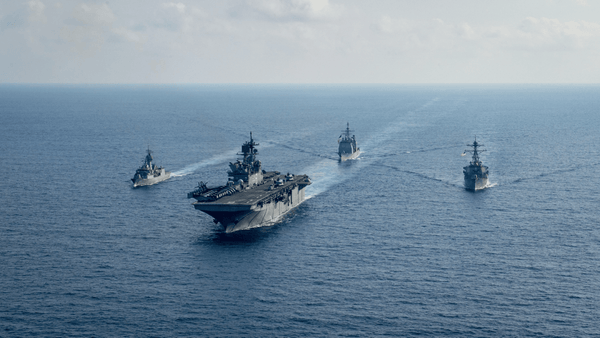By Yasmin Ramlan
SHAH ALAM, June 13 — While the Kuala Lumpur (KL) Declaration signals Asean’s desire for peace and neutrality in the South China Sea, analysts warn that such a stance risks rendering the bloc ineffective against China’s delaying tactics and growing influence over claimant states.
Universiti Malaya sociopolitical analyst Datuk Prof Awang Azman Awang Pawi said Asean’s long-held vision of keeping the South China Sea a “sea of peace and prosperity” remains largely aspirational without a legally binding Code of Conduct (COC).
“The KL Declaration and Asean Community Vision 2045 documents reflect normative commitments that are aspirational in nature,” he told Media Selangor.
“However, without a legally binding COC, the ambition to maintain the South China Sea as a peaceful and prosperous zone remains vulnerable to unilateral actions, grey-zone operations, and coercive diplomacy, mainly by China, which has militarised artificial islands, disrupted fishing rights, and obstructed oil exploration by Asean member states.”
[caption id="attachment_402271" align="alignnone" width="1200"] Asean delegates pose after the Kuala Lumpur Declaration signing ceremony at the Kuala Lumpur Convention Centre, on May 26, 2025. — Picture by REMY ARIFIN/MEDIA SELANGOR[/caption]
Asean delegates pose after the Kuala Lumpur Declaration signing ceremony at the Kuala Lumpur Convention Centre, on May 26, 2025. — Picture by REMY ARIFIN/MEDIA SELANGOR[/caption]
Awang Azman said while some practical measures have been attempted, such as joint patrol and maritime boundary talks, these efforts are fragmented and undermine regional unity.
“Asean’s ability to enforce peace in the South China Sea is weak without binding mechanisms or great power backing, such as through United Nations Convention on the Law of the Sea (Unclos), enforcement or multilateral coalitions,” he said.
The KL Declaration, which was signed on May 26 during the 46th Asean Summit in Kuala Lumpur, reaffirms Asean’s commitment to maintaining the South China Sea as a zone of peace, stability, and sustainable development.
Among its main objectives are enhancing dialogue and consultations with China, ensuring the full implementation of the 2002 Declaration on the Conduct of Parties (DOC), and advancing negotiations towards an effective and legally binding COC in accordance with international law, particularly the 1982 Unclos.
Awang Azman said internal divisions among Asean members, especially between claimant and non-claimant states, have further hampered progress on the disputed waters.
“China's preference for bilateral talks (which are dividing Asean), along with disagreements over the legal status of the waters and internal divisions, especially between claimant states like Vietnam and the Philippines and non-claimants like Cambodia and Laos who are more vulnerable to China’s economic influence, have all contributed to delays," he said.
[caption id="attachment_403967" align="alignnone" width="1200"] US soldiers participate in a live fire exercise during the annual joint military exercises between US and Philippines called ‘Balikatan’ or shoulder-to-shoulder, at Laoag, Ilocos Norte, Philippines, overlooking the South China Sea, on May 6, 2024. — Picture by REUTERS[/caption]
US soldiers participate in a live fire exercise during the annual joint military exercises between US and Philippines called ‘Balikatan’ or shoulder-to-shoulder, at Laoag, Ilocos Norte, Philippines, overlooking the South China Sea, on May 6, 2024. — Picture by REUTERS[/caption]
Asean’s neutral, careful move
Echoing these views, geostrategist and Nusantara Academy for Strategic Research senior fellow Azmi Hassan said the KL Declaration’s emphasis on neutrality reflects Asean’s careful balancing act but ultimately works to Beijing’s advantage.
"Somewhere within the KL Declaration, though it does not explicitly mention the South China Sea, is the Asean chair’s view that the bloc needs to make decisions by consensus and not be influenced by major powers.
“And this is very apparent in the South China Sea conflict, where (such an approach) tends to benefit Beijing," he said.
Azmi pointed out that China is unlikely to agree to a legally binding COC as its territorial claims on the contested maritime region are not based on international law.
"I believe Beijing loves the current state of Asean, which is effectively divided into three blocs — one leaning toward China, another aligned with the United States, and a third maintaining neutrality.
“That’s the reason why the COC negotiations have dragged on ... because as far as Beijing is concerned, it is not to their advantage to finalise the code.
“The COC is grounded in Unclos, the maritime law of the United Nations, whereas China’s claim over the South China Sea is not based on international legal frameworks," he said.
[caption id="attachment_403968" align="alignnone" width="1200"] Chinese naval soldiers patrol the Paracel Islands in January 2016. Beijing's growing clout in the South China Sea has been a cause for concern. — Picture by REUTERS[/caption]
Chinese naval soldiers patrol the Paracel Islands in January 2016. Beijing's growing clout in the South China Sea has been a cause for concern. — Picture by REUTERS[/caption]
The KL Declaration document also stated the importance of confidence-building measures to prevent incidents at sea, practical steps to ease tensions and reduce risks of miscalculation, and ensuring freedom of navigation and overflight.
It added that Asean is committed to fostering cooperation among its member states and external partners through joint activities under the DOC framework to build mutual trust and strengthen regional security.
However, Azmi noted that China continues to reject bloc-level negotiations with Asean, preferring instead to engage individually with the four main claimant countries.
"That’s the reason why they prefer bilateral talks, not with Asean, but with the four claimant states directly involved with China, namely Malaysia, Brunei, Vietnam, and the Philippines," he said.
Both analysts warned that unless Asean enhances its internal cohesion, leverages international law through Unclos, and gains stronger backing from like-minded external partners, the COC process may remain forever delayed.
They added that without these efforts, Asean’s ambition to make the South China Sea a zone of peace and prosperity risks becoming yet another diplomatic aspiration rather than a practical reality.
"Without these, Asean’s bargaining power remains symbolic at best," Awang Azman said.




